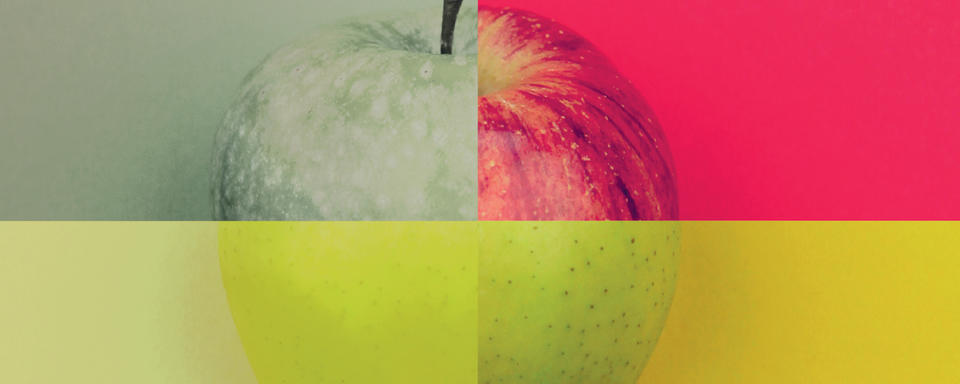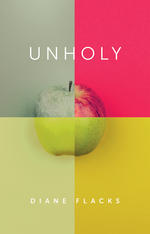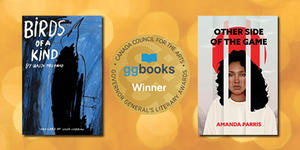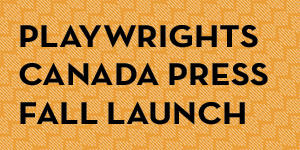
Read an excerpt from Unholy
Should women abandon religion?
That is the loaded question posed to four female panellists on a televised debate in Diane Flacks’s Unholy. Throughout the play, the debaters wrestle with themselves and each other: Can you be a feminist and believe in religion? What can or can’t be forgiven? Why do we have faith to begin with? The debate becomes and more and more personally charged, until it climaxes in an epic battle, culminating in a possible leap of faith.
See how it all starts in this excerpt from the first scene of Unholy.
***
The stage is set up for a debate with two teams. There are four comfortable chairs, situated behind two tables, and a podium in the centre. The chairs all have mics.
A slide at the back of the stage reads, “Should Women Abandon Religion? A Unique Ideas Now Debate, with your host: Richard Morris.”
At the downstage is a long, low narrow beam.
There are four panellists on stage. On one side is MARYAM, a poised young lawyer wearing a light silk scarf around her neck, and YEHUDIT, a confident Orthodox Jewish scholar in her late thirties to early forties. On the other side is LIZ, a middle-aged antitheist, stylishly dressed, and MARGARET, an ex-nun in her seventies.
At a podium is the moderator, RICHARD, smooth, charming, smarter than he looks.
Lights snap up on the debate. They are mid-fight, all loudly talking at once, concurrently, overlapping. The debate is played realistically—the women listening and taking notes and fighting for their points.
MARYAM: No no no wait wait wait—
LIZ: Answer the question—
MARYAM: Listen, listen—
YEHUDIT: UnbeLIEvable!
RICHARD: One at a time! One at a time.
LIZ: I’m simply asking—
MARGARET: Richard . . . Can we . . . oh my . . .
YEHUDIT: OutRAgeous!
LIZ: Wow, this is—
MARYAM: I’m trying to—
RICHARD: All right all right all right! One at a time! Ladies ladies! MICS!
RICHARD motions to the booth to cut off the women’s mics, which they do. For a minute, everyone is still arguing with less sound.
(to audience) That was Dominic. Give us a flash, Dominic.
The stage lights flash.
Dominic is our floor director. He’s the grand overseer of the five TV cameras that are recording this debate tonight for our YouTube channel. He swears this debate will help us break one million views and I tip my hat to that. Now, ladies, ladies, ladies, we appreciate your passion, believe me, and I did promise a brief free discussion before your opening statements, but free does not mean yelling. We have to at least be able to hear / each other—
LIZ starts talking, despite her mic being off. After a beat, RICHARD motions for it to be restored.
LIZ: What I hear, with respect, are apologists. Look, Richard, I want to say that every religion has at its core a hard and polished gem of beauty. I want to say that the goal of religion is to bring love and compassion to this sadistic and lonely world. I want to say that . . . But I can’t. Because it’s not true. In Tennessee, a bill was voted into law almost unanimously, and it’s one of a wave of these bills eviscerating the US—in this handmaid’s-tale dystopian deathly reality show we are living in—but this one is for schools: the Religious Viewpoints Anti-Discrimination Act. Sounds affirming, right? Like “men’s rights”? Or “REAL Women” or “alt-right”? Or “populist.”
Well, it would allow homophobic kids to physically assault gay kids in the name of freedom of religious expression. This is happening now.
YEHUDIT: Exactly. In the name of religion. Religion is being used. I can’t speak for the alt-right Christians, but in Orthodox Judaism this is not acceptable. A key tenet is Kvod HaBriyot, respect for all creations, for human / dignity.
LIZ: This is happening now, in the name of our religion: in Jerusalem, an eight-year-old girl is surrounded and spat on by a group of bearded, sweating Haredi men for “dressing immodestly.” She’s eight! She should be able to dress like a unicorn if she wants to!
RICHARD laughs.
Or a TV host. Journalist?
RICHARD: Ya.
LIZ: Ya. This is happening now: ISIS, ISIL, whatever, are—
MARYAM: We prefer “Daesh,” which is pejorative.
LIZ: You don’t want to talk about ISIS, can we talk about Boko Haram, then? Which translates as “education is forbidden,” if I’m not mistaken, Maryam?
MARYAM: I don’t speak Arabic. I’m Iranian. I speak Farsi. / As you know.
LIZ: Do you? Remember those two hundred girls who were kid- napped in Nigeria four years ago? We had to forget about them in the face of the next atrocity perpetrated in the name of Islam. Boko Haram is now using girls as walking explosives, / as human bombs—
MARYAM: Boko Haram do not represent Islam. The prophet Mohammad, upon him be peace, said the opposite, “seek education from the cradle to the grave.”
LIZ: And if you’re a Muslim girl, seeking education can get you shot in the face.
RICHARD: Margaret—you believe that women should abandon the Catholic Church?
MARGARET: Well, yes.
RICHARD: You have left the Catholic Church.
MARGARET: Yes. I am an ex-nun. I’ve just got my one-year chip.
RICHARD: Really?
MARGARET: No. I’m making a joke about Alcoholics Anonymous.
RICHARD: But you still refer to yourself as a Catholic. You’re not an ex-Catholic.
Margaret: If Jesus were walking around now, seeing how the Catholic Church has betrayed his message, simply, of love and compassion, he would just . . . shake the rafters! The Catholic Church needs to own up to the damage they have done and beg for forgiveness—
RICHARD: Would you forgive them?
MARGARET: Well, I’d like to see it happen.
YEHUDIT: Some things are unforgivable.
RICHARD catches this and presses her.
RICHARD: So, Yehudit—
He pronounces her name incorrectly, like Yehoodiht.
—no forgiveness for sin?
YEHUDIT: Jews are not so much into forgiveness. It’s Yehudeet.
RICHARD: (trying, failing) Yehudiht?
LIZ: It’s true. Forgiveness and Jews? Not so much.
YEHUDIT: It is a little namby-pamby. “I’m sorry, I did it” and it’s over? No. You need to make restitution, take action. We say “teshu- vah,” turning all the way around.
RICHARD: Pope John Paul apologized in 2000—
MARGARET: He did. Oh he was a lovely, lovely pope. For the Crusades, the Inquisition, the persecution of the Jews, uh, (read- ing from her notes) let me just . . . see . . . the silence during the Holocaust, the oppression of women, the forced conversion of Indigenous people, limbo—that was a cruel mistake and he admit- ted it. I had high hopes after that, but it went the other way.
RICHARD: Pope Francis said gay people are welcome—
LIZ: And so are pedophiles. Come on. Friendly Francis? It’s a sham.
And he clearly isn’t welcoming women into the tent—
MARGARET: No women clergy.
LIZ: Which / would change—
MARGARET: Which would change everything. Sorry, Liz, / go ahead.
LIZ: Go ahead.
MARGARET: You— /
LIZ: No, you. / Go.
MARGARET: Go. You . . . Uhhhh . . . ?
MARGARET has lost her train of thought.
LIZ: (prompting) No women clergy . . . which is . . .
MARGARET: Right, because then the Catholic Church would have to take children and families really into account in all their / actions.
LIZ: Instead we have a bunch of celibate men in dresses with their vaginal-probe population police telling Catholics how to have families. When do we say enough?!
MARYAM: Rabbah Yehudit and I are saying it every day, and we don’t have to cut off our noses to spite our faces. My opponent’s com- plaint is with fundamentalism. Fundamentalism—in religions, as in secular politics—is an immature fear-based response. I’m confident that, with thought, with honesty and guidance, religion will grow out of it. And my question is: What will we grow into? Cynicism, more fear, isolationism?
LIZ: Cynicism is healthy.
YEHUDIT: Cynicism is easy.
MARYAM: You say you cannot be a feminist and believe in religion? Well, here I am.
MARYAM steps out of her chair and strides forward confidently toward the audience. Then she turns toward Liz and holds out her hand for LIZ to touch. It is a provocative and vulnerable gesture. LIZ is uncomfortable but does it. MARYAM holds LIZ’S hands affectionately.
See, you can touch me and neither of us dissolve.
MARYAM kisses Margaret on her cheeks. MARGARET adores it. She whispers to LIZ, accidentally speaking fully into her mic.
MARGARET: She’s a lovely girl.
MARYAM smiles and addresses the audience.
MARYAM: I know when you first came in here tonight, you voted for which team you think should win, and I expect, Yehudit, that we are the underdogs in this crowd. Yes, Richard?
RICHARD: According to these first vote results, I’m going to have to say yes, but the audience will vote again at the end. The winner of this debate will be the team who changes the most minds.
MARYAM: Wonderful.
YEHUDIT: Baruch HaShem. [God bless.]
MARYAM: So. I ask you to contemplate this: women multi-task, yes? We can hold duality of thought, two seemingly opposing ideas at once: life and death, joy and rage—or as I do: feminism and religion. As my learned colleague Rabbah Yehudit says, religion is not the cause of evil. It’s our attitude toward it that determines whether we choose to be united in the light, or divided in the dark.
LIZ: What’s more divisive than religion?
YEHUDIT: Politics, money—
MARYAM: Race, sex—
YEHUDIT: Power—
MARYAM: Narcissism.
LIZ: And of all these, religion is the worst.
YEHUDIT: Judaism honours women.
LIZ: As child-bearing machines, right, Margaret?
MARGARET: Right. Oh, / wrong.
MARYAM: In Islam, a mother must be shown three times the kind- ness of anyone else. The prophet Mohammad, upon him be peace, when asked who should be shown the most compassion, said, “Your mother.” Who next? “Your mother.” Who / next—
LIZ: Mohammad married a nine-year-old girl.
MARYAM: That was in the context of his time. People only lived to forty-five—
LIZ: Tell that to Roy Moore. In 2014, an eleven-year-old Muslim child bride died in Yemen, her pelvis broken on her wedding night / by her forty-year-old husband—
MARYAM: This is an apocryphal story. / Google it.
LIZ: Sure, why listen to girl victims?
MARYAM: The Quran commands us to speak against evils like this. “Believers conduct yourself with justice and bear true witness before god, even if it be against yourselves, your parents, and your community.”
LIZ: And a female witness is worth one half of a man.
MARYAM: Richard, I am—
(to YEHUDIT) We are—going to build something, not just tear down. My new progressive Muslim movement calls for real Islam: peace.
LIZ: You were the one who received death threats—
MARYAM: And I am not afraid! If we can allow the best of religious values to inspire us to be our best selves, exclude no one in doing so, we women will change the world! In the words of the late Czech pres- ident Václav Havel, “The rules of human coexistence can work only if they grow out of the deepest experience of everyone, not just some.”
RICHARD: Here we go!
RICHARD claps his hands together, excited—the game is on.
Lights. Transition.
The women walk to the downstage edge of the stage and go into individual moments of “prayer” or holiness under music. YEHUDIT prays with a talit; MARGARET does her rosary; MARYAM washes her hands and arms, then kneels and begins to pray; and LIZ scrolls through her phone and chuckles.
Then the ding of elevator doors opening and the four walk in. It is the night before the debate. They are in the elevator together for a moment.
***
Need to know what happens next? Get your copy of Unholy now!
In Toronto? You can catch Diane reading from Unholy at the Pivot Reading Series on November 21!



Comments